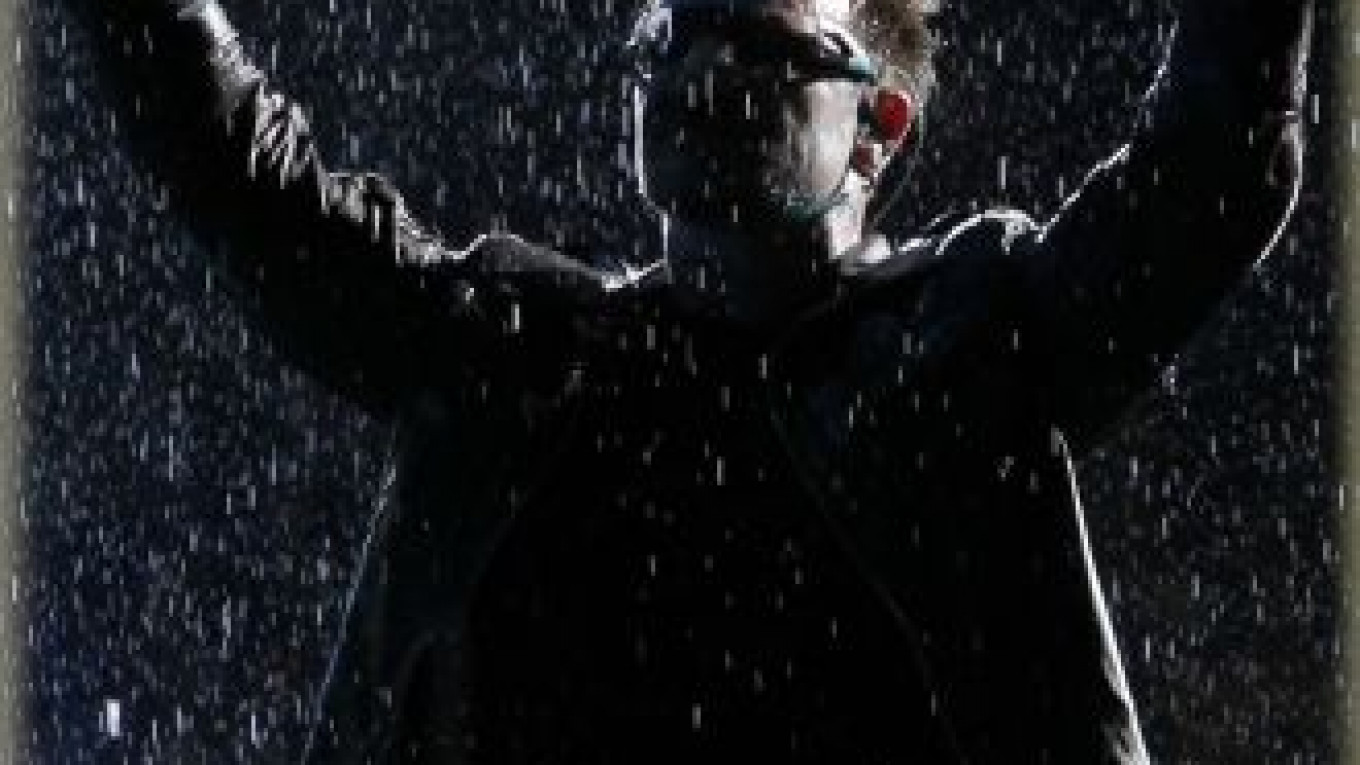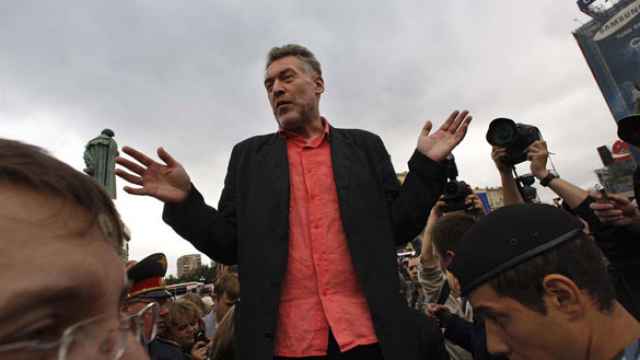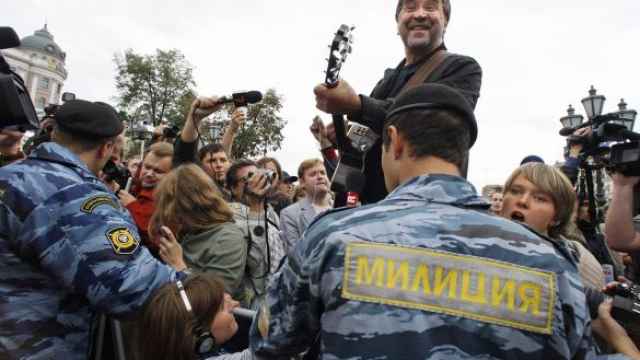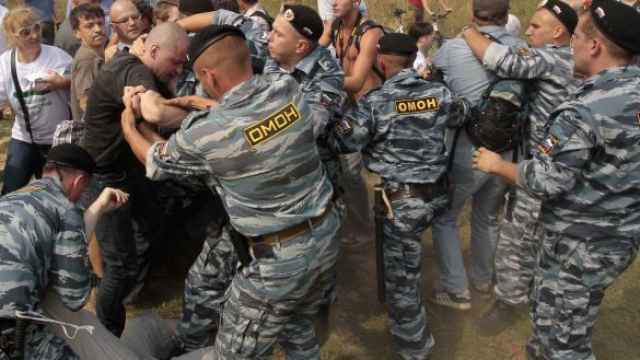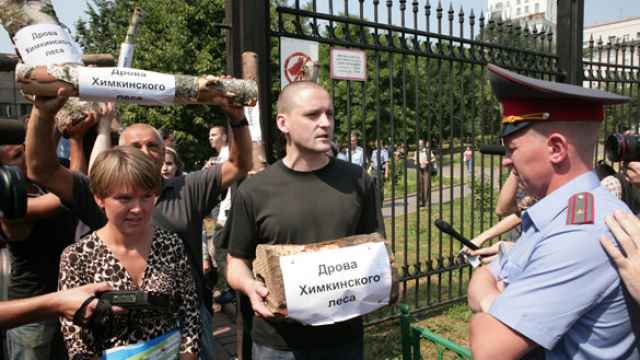President Dmitry Medvedev ordered a halt to the construction of a highway through the Khimki forest Thursday, marking a rare victory for a grassroots effort that the authorities heavy-handedly tried to squash but nevertheless swelled into a thousands-strong rally last weekend and the intervention of U2 frontman Bono.
Medvedev, whose last public comment on the forest was a pledge to consider the issue after being asked about it in Paris on March 2, stopped the partial demolition of the ancient oak forest, planned to make way for an $8 billion highway from Moscow to St. Petersburg, after United Russia unexpectedly sided with growing public discontent over the project.
“Our people, including representatives of the political parties, from the ruling United Russia to opposition ones, as well as public groups and expert circles, say that additional analysis is needed,” Medvedev said in a two-minute video posted on his blog, standing with his back to the green foliage of a forest.
Medvedev promised to initiate a public discussion.
"I can't predict the result of the discussion, but the issue is resonating throughout society," he said.
Yevgenia Chirikova, the businesswoman who led the efforts to stop the deforestation, called the apparent change of heart a victory for civil society.
“I think it's time for a celebration already. Even if the decision is not final, the very fact that [Medvedev] stopped deforestation is a great victory,” she said, RIA-Novosti reported. "I think it will be followed by other victories because people will start believing in their own power."
Earlier Thursday, the head of United Russia's faction in the State Duma, Boris Gryzlov, urged Medvedev to “look into the situation” with the forest near Sheremetyevo Airport north of Moscow.
“A decision must be made either to change the highway's route or to proceed with the construction, but with a deeper understanding of the matter,” he said in a carefully worded statement on the party's web site.
Mayor Yury Luzhkov also supports an alternative route for the highway that would not require deforestation, Oleg Mitvol, a former federal environmental inspector who serves as prefect of the city's Northern Administrative District, RIA-Novosti reported.
Luzhkov, who was on vacation this week, did not comment on the highway.
The government's backdown on the highway marks a stunning reversal on a decision that had been vigorously defended by the government and backed by the Supreme Court, despite surveys that indicated the project had little support from all levels of society. Public anger over plans caused the European Bank of Reconstruction and Development to pull out of the project early this year.
Environmentalists and local residents, who blocked contractors from starting to clear trees by camping out in the forest in July, have been beaten by unknown assailants and questioned and detained by police both in the forest and during rallies in Moscow.
But the discontent continued to grow, climaxing with a rally of more than 3,000 people on Pushkin Square on Sunday. Rock legend Yury Shevchuk, who asked Prime Minister Vladimir Putin at a charity event in May to stop police crackdowns on rallies, headlined the rally and played two songs despite police efforts to enforce a concert ban imposed by City Hall.
Bono invited Shevchuk up on stage during U2's first-ever Russian show at Luzhniki stadium on Wednesday night (they sang Bob Dylan's classic “Knockin' on Heaven's Door”) for a performance that environmentalists said sent a clear signal to the authorities about the illegality of their crackdown on Khimki forest defenders.
“The fact that Bono was singing with Shevchuk was a clear answer to those who commit lawless actions,” said Sergei Tsiplyonkov, acting director of Greenpeace Russia.
Bono, an outspoken activist on various social issues, said during a meeting with environmentalists that he regretted not raising the Khimki forest issue during talks with Medvedev in Sochi on Tuesday and promised to assist the forest defenders, environmental activist Yaroslav Nikitenko told Interfax.
The activists' problems continued even on the day of U2's concert, with police targeting Greenpeace and Amnesty International activists, who usually stage small events before the band's gigs.
About 10 Greenpeace activists were asked to stop collecting signatures in support of Russian forests in the lobby of the Luzhniki stadium, Tsiplyonkov said. Amnesty activists also reported trouble with the police.
Artemy Troitsky, a prominent music critic and the host of Sunday's Pushkin Square rally, said Chirikova deserved all the praise. "She played solo, while Shevchuk and Bono were the backup vocalists," he said.
He said he felt encouraged about the state of civil society but worried that most Russians still did not care enough to stand up for their rights.
"This action shows that if people want something, it is possible to move mountains," he said in a telephone interview. "The other question is that in 99 percent of cases people don't want anything and prefer to live in the backwater." The highway project was further complicated by the fact that the company contracted to construct it, the North-Western Concession Company, has been linked in media reports to Arkady Rotenberg, Putin's friend and former judo trainer.
Rotenberg denied the reports Thursday, saying Igor Koryashkin, who sits on the North-Western Concession Company's board, does not represent him and is an independent director.
But Koryashkin also sits on the board of the Novorossiisk sea port, which is controlled by Rotenberg.
Putin, who heads United Russia, did not comment on the Khimki forest Thursday. His spokesman Dmitry Peskov said in July that the deforestation would proceed.
Stanislav Belkovsky, an independent analyst, said United Russia was aware that Medvedev had planned to halt the highway project and suggested that cracks were emerging in its once-steadfast alliance to Putin.
"The decision shows that the party is responding to orders from the top powers represented by Dmitry Medvedev and not to Vladimir Putin, the party leader," he said.
The authorities are known for being tone-deaf to grassroots campaigns, viewing them as a threat to their power. But things appear to be changing ahead of the upcoming election season, which kicks off with October regional elections and will culminate with the presidential vote in 2012.
Last week, United Russia withdrew its support of Kaliningrad Governor Georgy Boos, who faced mass protests in his region earlier this year, even though Gryzlov had promised to back Boos as recently as July 16. Medvedev subsequently decided not to nominate Boos for a second term.
Environmentalists have scored a victory with the authorities before. After protests, then-President Putin in 2006 ordered that an oil pipeline that was supposed to be constructed near Lake Baikal be moved away from its shores.
A Message from The Moscow Times:
Dear readers,
We are facing unprecedented challenges. Russia's Prosecutor General's Office has designated The Moscow Times as an "undesirable" organization, criminalizing our work and putting our staff at risk of prosecution. This follows our earlier unjust labeling as a "foreign agent."
These actions are direct attempts to silence independent journalism in Russia. The authorities claim our work "discredits the decisions of the Russian leadership." We see things differently: we strive to provide accurate, unbiased reporting on Russia.
We, the journalists of The Moscow Times, refuse to be silenced. But to continue our work, we need your help.
Your support, no matter how small, makes a world of difference. If you can, please support us monthly starting from just $2. It's quick to set up, and every contribution makes a significant impact.
By supporting The Moscow Times, you're defending open, independent journalism in the face of repression. Thank you for standing with us.
Remind me later.


